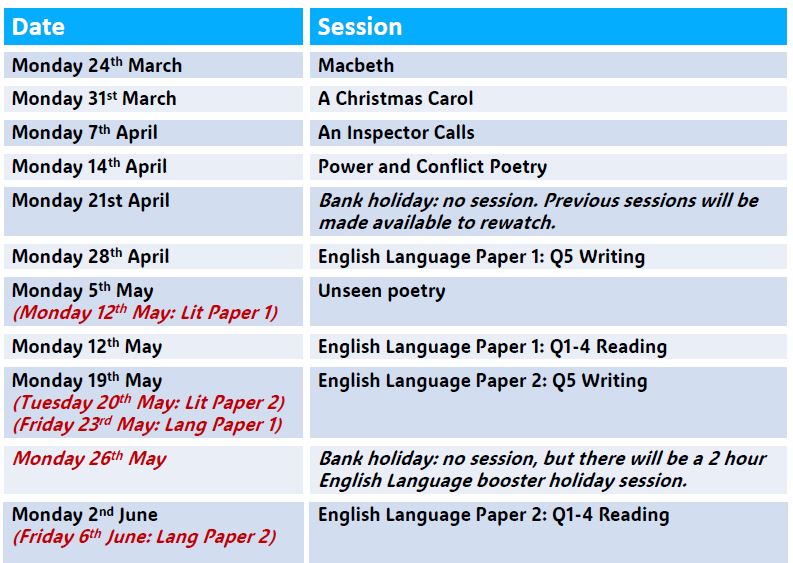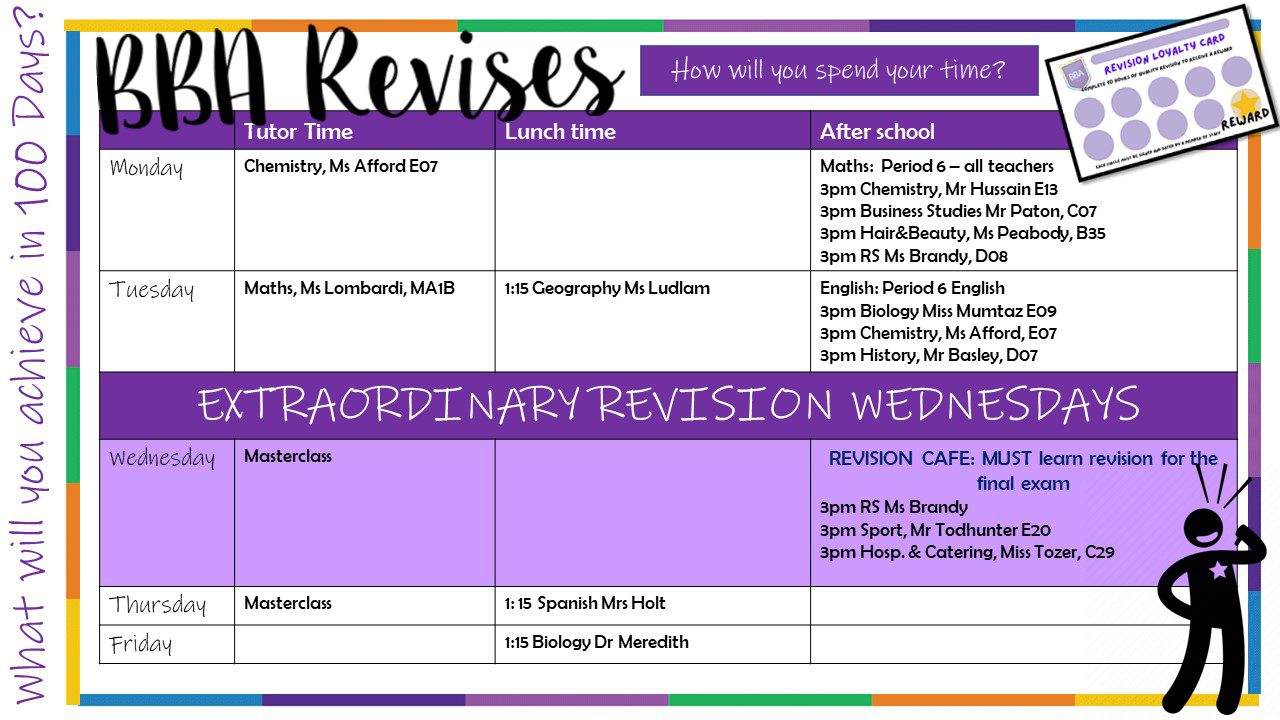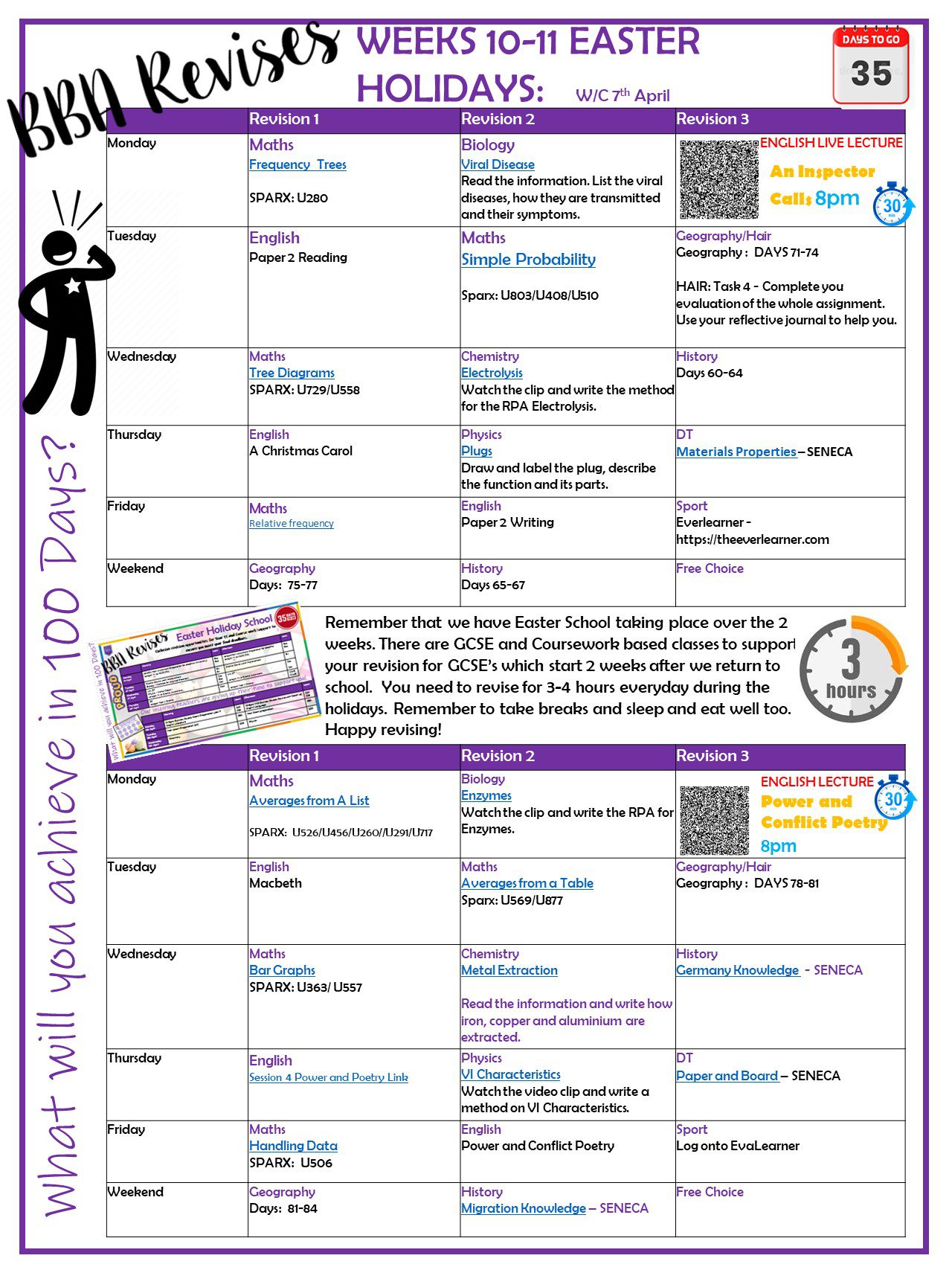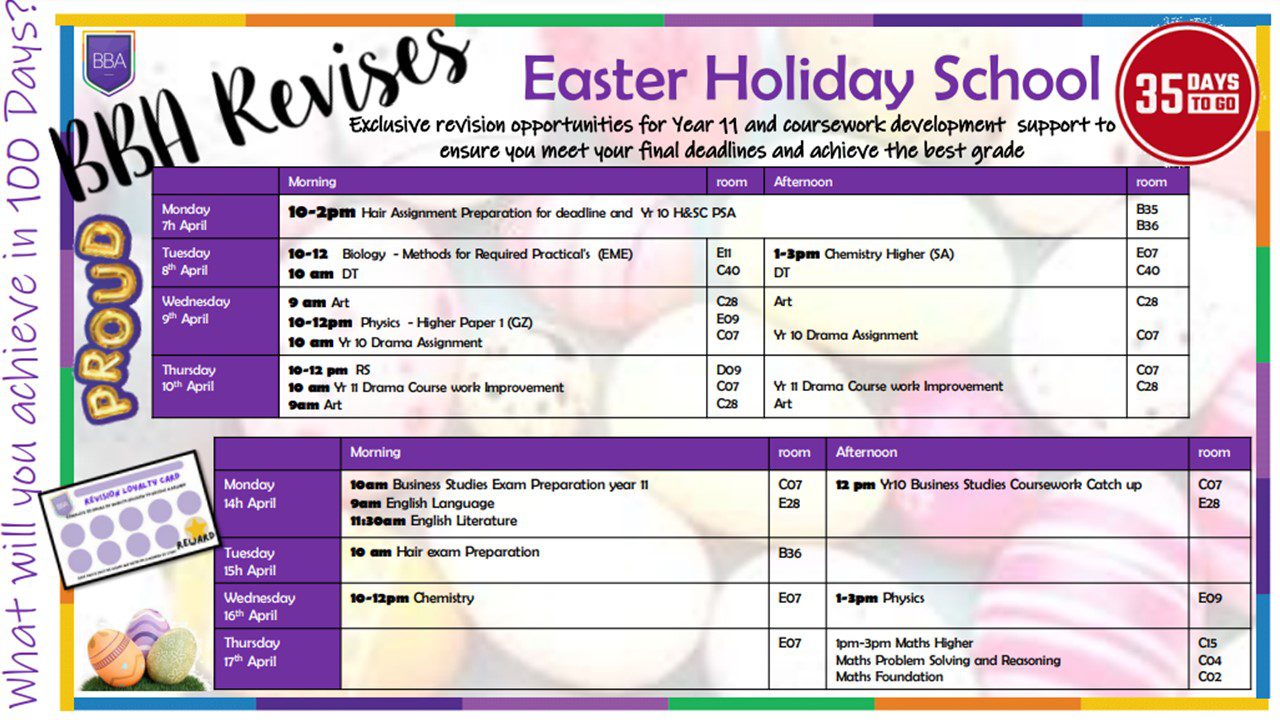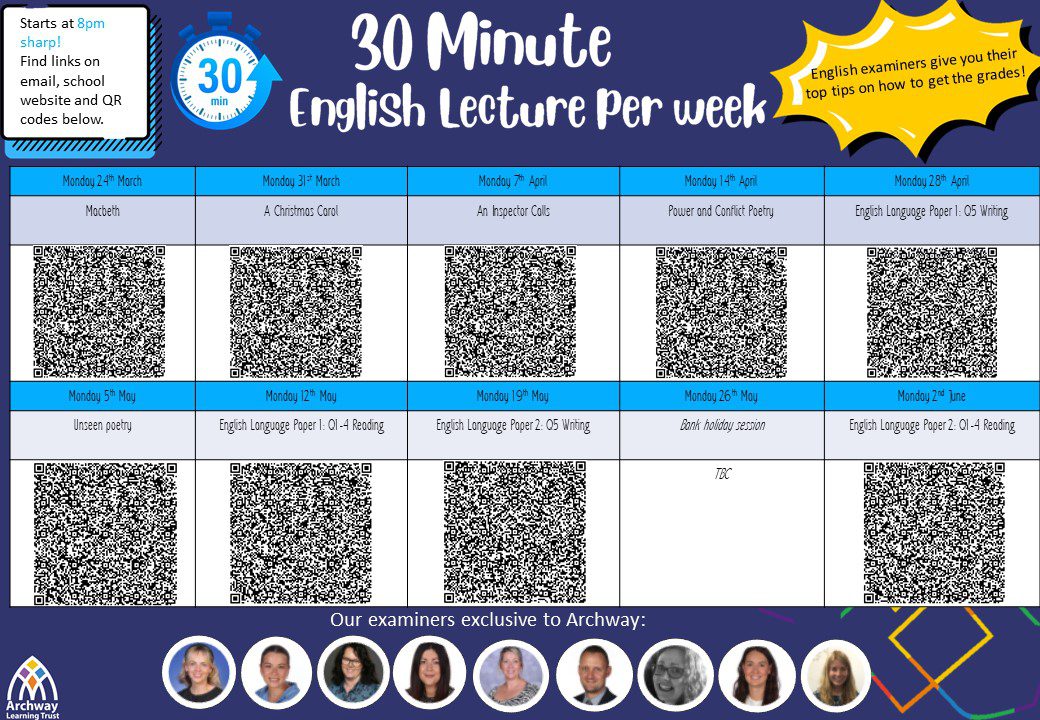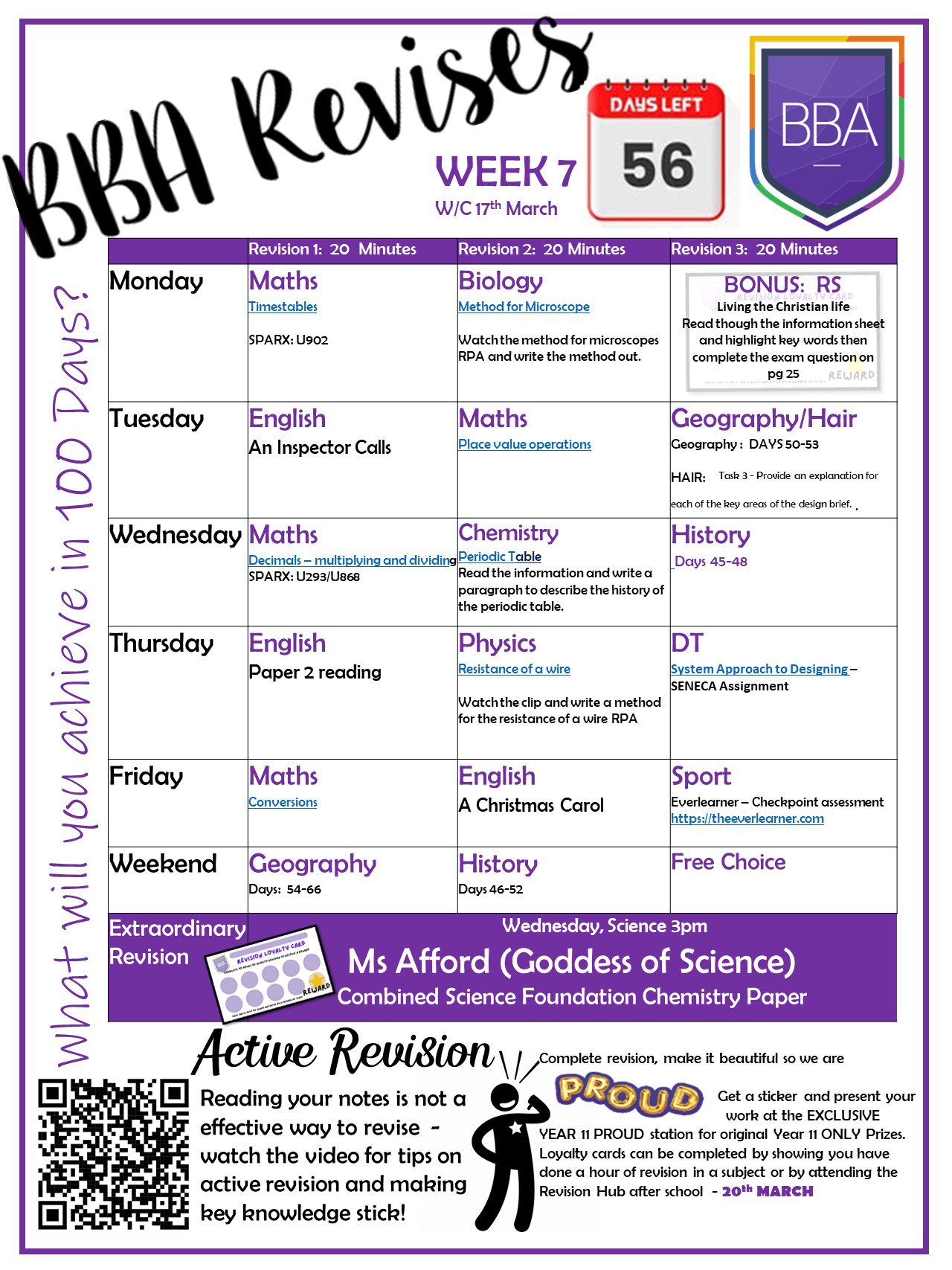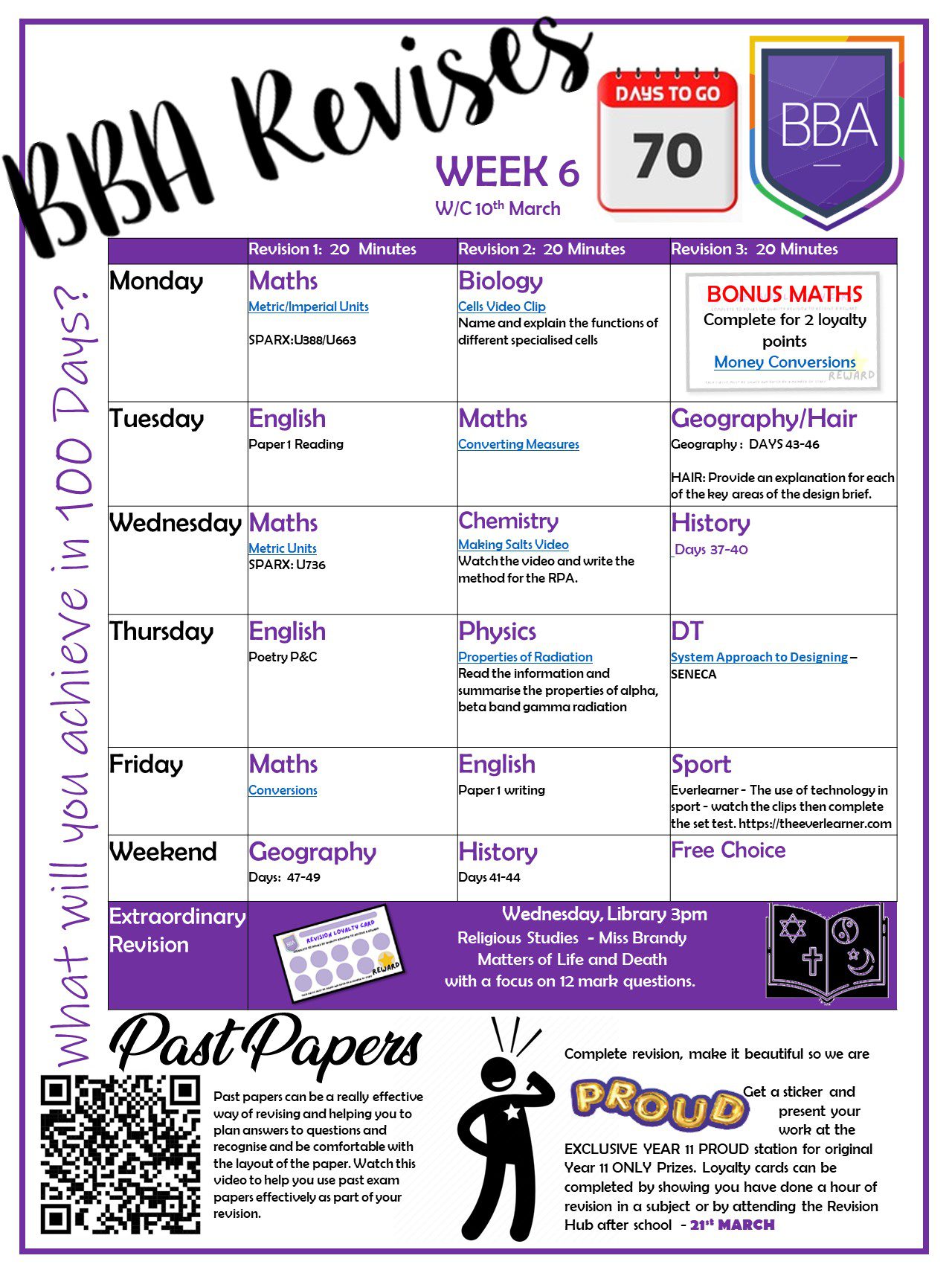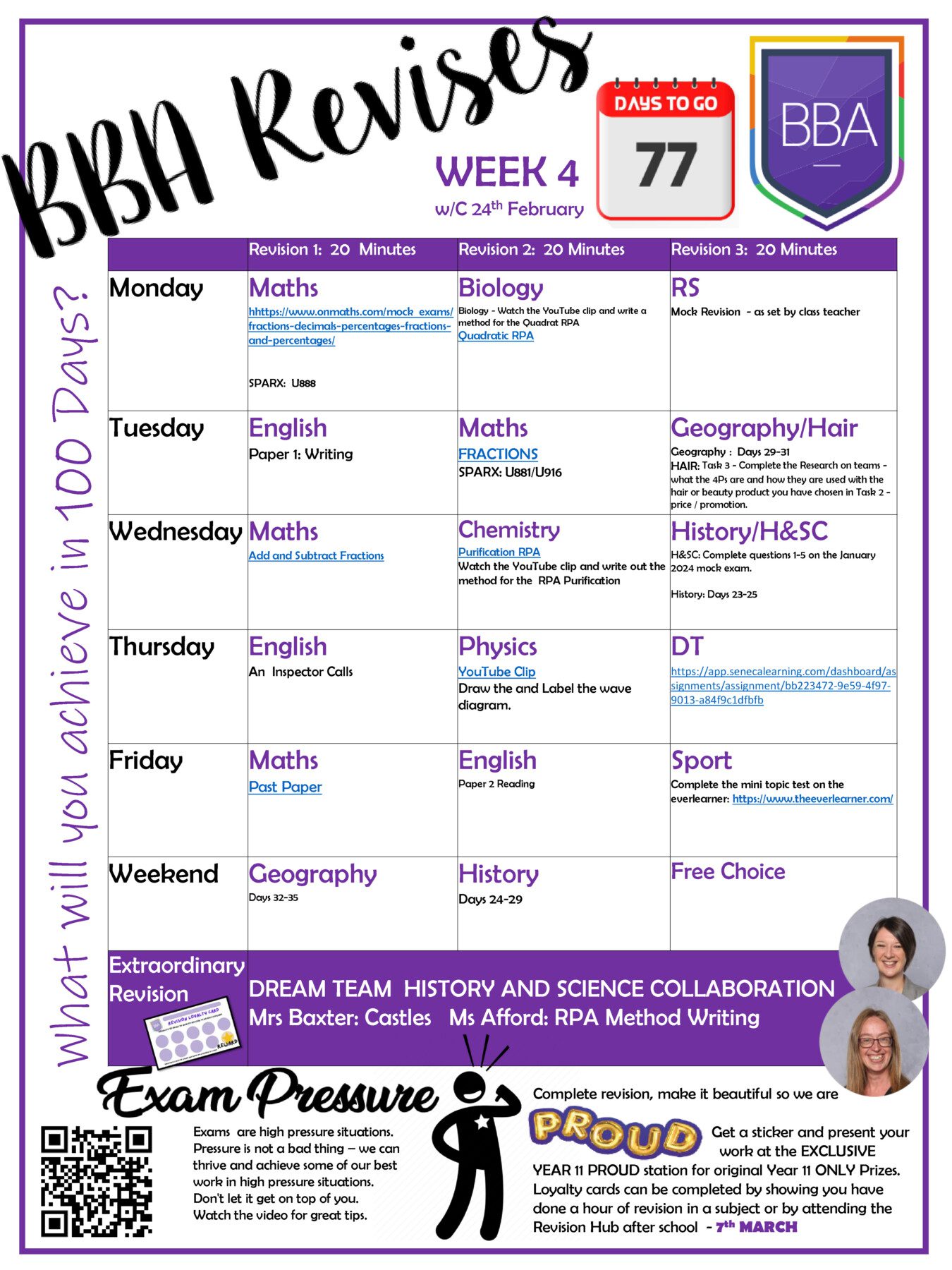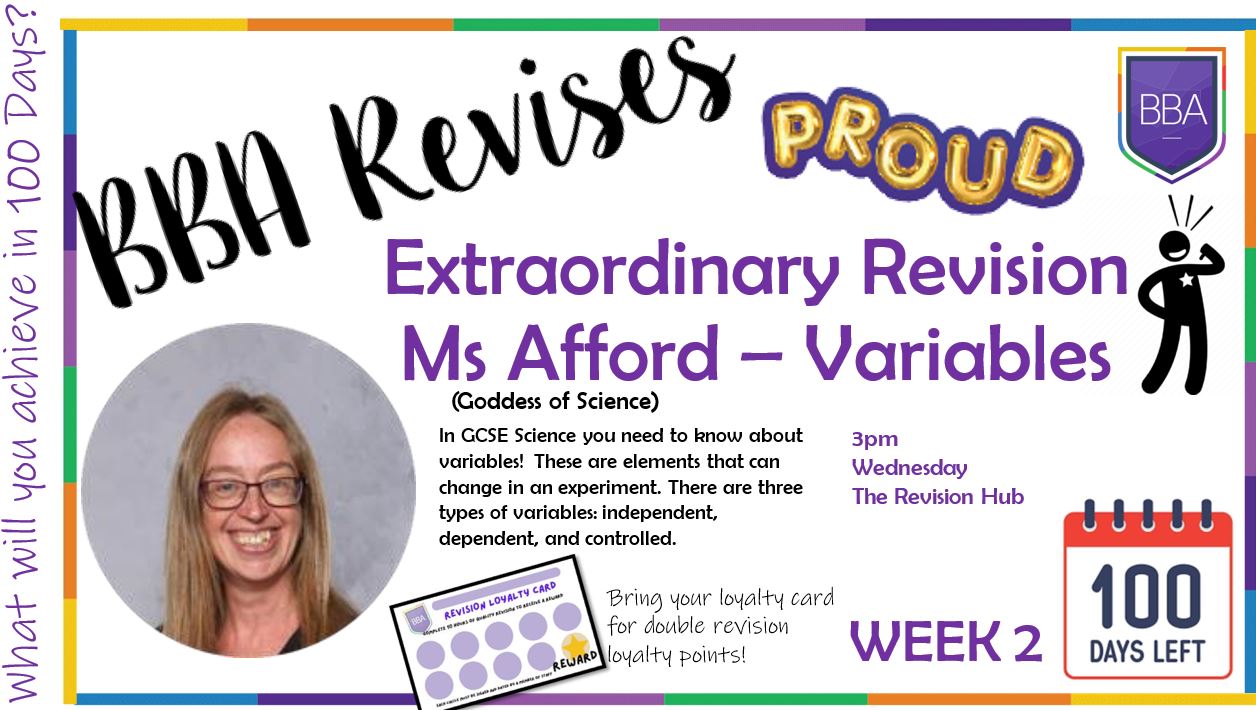| DATE | SESSION | SESSION LINK |
| Monday 24th March | Macbeth | Session 1 Macbeth Link |
| Monday 31st March | A Christmas Carol | Session 2 A Christmas Carol Link |
| Monday 7th April | An Inspector Calls | Session 3 An Inspector Calls Link |
| Monday 14th April | Power and Conflict Poetry | Session 4 Power and Poetry Link |
| Monday 28th April | English Language Paper 1: Q5 Writing | Session 5 P1 Q5 Writing Link |
| Monday 5th May
(Monday 12th May: Lit Paper 1) |
Unseen poetry | Session 6 Unseen Poetry Link |
| Monday 12th May | English Language Paper 1: Q1-4 Reading | Session 7 Lang P1 Q-14 Link |
| Monday 19th May (Tuesday 20th May: Lit Paper 2)
(Friday 23rd May: Lang Paper 1) |
English Language Paper 2: Q5 Writing | Session 8 Lang P2 Q5 Link |
| Monday 2nd June (Friday 6th June: Lang Paper 2) | English Language Paper 2: Q1-4 Reading | Session 9 Lang P2 Q1-4 Link |
100 days of revision for year 11 students
Please scroll down the page for revision timetables for you to follow each week!
We are excited to introduce a new revision initiative designed to support your child’s preparation for their upcoming exams: BBA Revises – 100 DAYS. This initiative aims to break down revision into manageable, daily tasks, ensuring that students feel confident and prepared for both their mock exams and final exams.
What is the 100 DAYS Programme?
The program focuses on daily revision, with each student committing to at least one hour of revision every day. By setting small, consistent goals, students can cover all necessary material without feeling overwhelmed or relying on last-minute cramming. Each week, your child will receive a detailed revision plan via email and through our school’s social media channels, which will outline the topics they need to focus on. These weekly plans are designed to keep students on track and ensure that they are revising effectively across all subjects.
How Will This Benefit Your Child?
- Structured Revision: By breaking down revision into smaller, manageable chunks, we ensure that students feel confident about the progress they’re making.
- Motivation: The program includes an element of rewards for students who demonstrate consistent effort and produce revision work they are proud of.
- Community Support: This is a community-driven approach, meaning that students will not be alone in their journey. They will be encouraged to share their progress, celebrate achievements, and motivate each other.
Rewarding Revision
- Your child will be given a revision loyalty card. When they complete any revision they should show this to the class teacher so that their teacher is able to sign off their cards and monitor how much quality revision is being competed. We aim to achieve 5000 hours of collective revision before the exams start.
- Students should also aim to collect PROUD stickers for creating quality and beautiful Students can take their revision to the Proud station and present their work at the EXCLUSIVE YEAR 11 PROUD station for Year 11 ONLY Prizes. If students bring their fully completed loyalty card, they will receive an additional prize. Loyalty cards can be complete by showing you have done an hour of revision in a subject or by attending the Revision Hub after school.
REVISION HUB and Extraordinary Revision
The Revision Hub is open in the library every day until 5pm. Mrs Slater has a wealth of experience in supporting with revision techniques and can supply your child with any revision resources they need. This is a quiet and purposeful space to work. Extraordinary Revision takes place every Wednesday at 3pm. Staff from across school will deliver a 30 minute Masterclass on a key concept linked to the exams. Please encourage your child to attend.
Revision for all year groups
Effective revision requires a great deal of self-discipline and focus. Use these tips to help you keep on-task.
How to get your revision plan right
- Be realistic and plan time away from your work to avoid burn-out
- Make sure you study the hardest subjects first, and not at end of day when you are tired.
- Be focused: 20 minutes working followed by 10 minutes rest is a good starting point.
- Leave your phone turned off/on silent in a different room whilst you are revising.
- In every hour, only work for 50 minutes at a time and take a break away from your revision.
- Planning helps you to balance your time so that you don’t spend all your time revising one subject.
- If you share your revision plan with friends or family then you are more likely to stick to it.
- Make sure you give yourself breaks and allow time to relax and do the things you want to do and enjoy doing.
- Don’t worry about other students’ revision plans, everyone does it differently.
Content from BBC Bitesize.
Film with GCSE and Nationals revision tips and advice, from exam survivors The Mind Set
STEP ONE: WORK OUT HOW MUCH TIME YOU HAVE TO REVISE
Give yourself just enough time to make your revision goals achievable. You want to feel a little bit of time pressure, but not too much. Strike a balance between ambition and realism. On your calendar, make sure you fill in your current commitments and day to day activities. For example; when you’re at school, having meals, exercising or just doing the other hobbies and activities you do during your standard week.
STEP TWO: PRIORITISE YOUR SUBJECTS / TOPICS
The next step requires some introspection. You need to decide which subjects you currently feel the most and least confident about. The best way to do this is to make a list. Write the subjects you’re weakest at towards the top and those where you’re strongest towards the bottom. Give each of them a number as a reminder for when you input them into your timetable.
When you’re making this list take into account a couple of other factors such as:
- The amount of material to be learned within each subject.
- Mark weightings within subjects.
- The order of your exam timetable (if you have it already). You’re going to have more time to revise some subjects than others based on where they are positioned within your exam timetable.
- What your grades currently look like – for example, if your Physics grade is rock bottom, you might want to prioritise it above the English Literature class you’ve already got 60% in through nailing the coursework (if applicable)
STEP THREE: BREAK SUBJECTS INTO TOPICS
“Our brain tricks us into believing the low-hanging fruit really is the ripest”. Conversely, when one option is harder to get, we’re more likely to think it’s the wrong choice. You need to be fully aware of what you don’t know and consciously choose to meet those challenges head on. Use the exam rubric to break down what you need to learn.
STEP FOUR: ALLOCATE SLOTS TO REVISE
Allocate 30-60 minute time slots to study each topic. Here’s the workflow you need to follow when scheduling your sessions:
- Position topics you’re likely to find challenging when you know you tend to work best in the day.
- Use colours to differentiate subjects from one another in your calendar and make sure you write the subject and topic you need to revise
- Find a balance between topics you’re less familiar with and those which you think you’ll be able to get through quickly. Use the list you created in Step 2. This will keep a nice balance between revision being a challenge and you making good progress.
- Leave a few time slots blank towards the end of the day for some rapid reviews and testing.
STEP FIVE: MAKE YOUR TIMETABLE ACHIEVABLE
Make your timetable achievable by managing your health and stress levels and by allocating time to exercise, socialise and generally forget about revision for a bit. If you followed Step 1 you should be in a good spot already.
Revision requires high levels of:
- Self awareness
- Discipline
- Adaptability
- Organisation
As much as exams are testing you about what you know in each subject, they’re also testing you for these 4 skills, all of which are critical to your development later in life.
Finally, refer to your timetable often so you can gut-check how your pacing, some days you’re going to have to work faster and longer than usual, others you can afford to ease off a bit. It’s up to you to make that judgement call.


